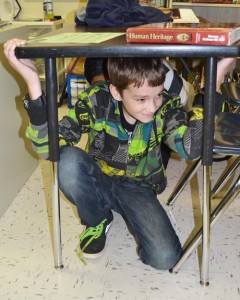
students got under their desks and held on for the duration of an imaginary earthquake during the Great Shake-Out Drill Oct. 15.
First in a series on earthquake preparedness.
By Kristine Thomas
Mount Angel Police Chief Michael Healy keeps a suitcase in his car with everything he might need, just in case he can’t get home for a day or two. And he recommends everyone else follow suit.
From an article in The New York Times to a special on Oregon Public Broadcasting, there has been a great deal of focus on the Pacific Northwest’s need to be prepared for an earthquake.
“I work in Mount Angel but I live in Lebanon,” Healy said. “If an earthquake or something else were to happen where I couldn’t get home for a couple days, I need to be prepared. It’s not if an earthquake will happen, it’s when.”
Healy emphasized the importance of every citizen being prepared in case of a natural disaster or adverse weather.
“People need to be self-sufficient for at least five days,” he said.
Mount Angel City Manager Eileen Stein said while she thinks most buildings in her city may be able to withstand an earthquake, what concerns her most is days of isolation.
“We have to think about the bridges that could go down and what that means for delivery trucks having access to Mount Angel,” she said.
“If there is an earthquake, the delivery trucks aren’t going to be able to get to Roth’s or Safeway to fill shelves,” Healy added.
Both Healy and Stein said the city, the Mount Angel Fire Department and the Community Response Team (CERT) have an emergency operations plan in place for what will happen in case of a natural disaster.
Healy said there are designated emergency shelters including the Festhalle and the grounds at the Mount Angel Abbey. There are also plans on how to communicate with residents, even if the electricity and phone towers go out.
“When I worked in Sisters, there were several wildfires,” Stein said. “We held old-fashion town hall meetings. We had places were we had bulletin boards were we posted information.”
Healy was working in the police department in Stayton when the last earthquake happened.
“If something happens, I would ask people not to call 911 asking if we had an earthquake,” Healy said. “When people did that after the last earthquake, it tied up 911. Don’t call 911 unless you have a real emergency.”
Besides having an emergency supply kit at your home, in your car and at the office, Healy stressed the importance of having a family plan. With his wife working in Salem, himself in Mount Angel, his son in West Salem and daughter in Seattle, they all know who to call and what do to in case of an emergency.
Water, one gallon per person
per day for at least 3 days
Non-perishable food – 3 day supply
Battery-powered or hand crank radio,
flashlight and batteries
First aid kit
Whistle to signal for help
Plastic sheeting and duct tape
to shelter-in-place
Moist wipes, garbage bags
and plastic ties for personal sanitation
Wrench or pliers to turn off utilities
Manual can opener for food
“It’s important we all know what we will do when it happens and we are prepared when it does,” he said.
One advantage Mount Angel has, Stein said, is it is a small community where people take care of their family, neighbors and friends.
“If something happens, people will check in on the welfare of their neighbors,” she said. “We all need to be prepared and be able to survive until the government can step in, the power is back on and things are stabilized.”
 Stein and Healy understand most people don’t want to think about an earthquake. But they also know it’s not a topic that can be ignored.
Stein and Healy understand most people don’t want to think about an earthquake. But they also know it’s not a topic that can be ignored.
“We need people to just start thinking about it so they will be prepared when it does happen,” Healy said.
The students at Scotts Mills Elementary School participated in the Great Shake-Out Drill on Oct. 15.
Scotts Mills Principal Kirstin Jorgenson said state law requires schools prepare for emergencies including an earthquake, fire and an intruder.
“We need to practice these things so students will know what to do in case it does happen,” Jorgenson said. “We can’t stop things from happening but we can be prepared for the event.”
As both a mother and a principal, Jorgensen said it’s hard to talk about what to do if there were an earthquake.
“No one wants to talk about it, but we have to,” she said. “We all need to do our due diligence and be prepared.”